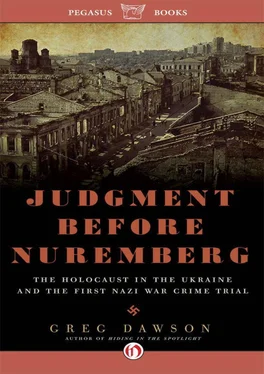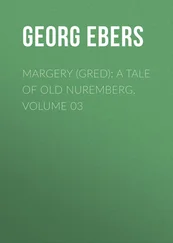Prosecution:Did you, Bulanov, see the gas van in which people were murdered with carbon monoxide?
Bulanov:In January, 1942, such a van arrived at our garage from Germany.
Prosecution:Did you have occasion to repair it?
Bulanov:I had occasion to repair it and clean it. When cleaning it and sweeping the inside I saw children’s caps and tiny shoes which had evidently fallen off the murdered children.
Prosecution:What remuneration did you receive from the Germans for your traitorous activities?
Bulanov:I received 90 reichmarks, or 900 rubles, as wages. I also received a soldier’s ration. Furthermore, the belongings of executed Soviet citizens—what remained after the Germans had selected the best for themselves—were given to us.
Prosecution:What things did you receive?
Bulanov:I received overcoats for my wife and myself, also two suits of clothes and footwear.
Prosecution:Accused Bulanov, it follows from your testimony that you betrayed your motherland, that you sold yourself to the Germans for ninety marks, took an active part in the systematic shootings and extermination of innocent Soviet people. Do you plead guilty to this?
Bulanov:Yes, I do.
The Tribunal heard from a series of witnesses, German and Russian, who added to the tapestry of horror woven by the testimony of the four defendants. In an ordinary murder trial, the loved ones of the victim fill a few seats in the courtroom but most are occupied by curious strangers with no personal stake in the outcome. This was not the case in the Opera House where, to some degree, all the onlookers were victims of the German occupation. And although the word “Jew” was never uttered in the courtroom, there could be little doubt among onlookers about the identity of their fellow citizens singled out as the primary targets of Nazi terror in Kharkov. Despite the Soviet charade, the Kharkov trial and others “exposed the overwhelming tragedy of the Soviet Jews,” wrote Alexander Prusin. “In the localities where the largest Jewish communities had lived before the war—the Baltic states, Belorussia, and the Ukraine—the population was well aware of the horrors of ghettos, camps, and execution sites.” [1] Prusin, “Fascists Criminals to the Gallows!”, Holocaust and Genocide Studies (2003), 21.
The audience was mostly female and old because the men of fighting age had gone off to war, or been imprisoned and killed. “The faces of these Kharkov civilians who had lived through two years of Nazi occupation were charged with a breathless tenseness that never once relaxed through the long hours of interrogation,” Edmund Stevens wrote. Fluent in Russian, Stevens spoke with people in the crowd during recesses in the trial.
“I discovered that many of the people in the audience had personal knowledge or experience of the events and atrocities described and had seen or known the defendants during the German occupation,” he wrote. “Several times during more gruesome bits of evidence, there were stifled sobs from some woman—not out of pity for the defendants. For the most part, the proceedings took place against a background of concentrated silence.”
It is difficult to isolate the less gruesome bits of evidence in the catalogue of atrocities provided by the witnesses. How to compare, on the gruesomeness scale, the sport-shooting of starving prisoners scrambling for food packets tossed into a huge crowd, to the killing of prisoners with shovels and spades when guards ran out bullets? Can either compare to the sight of arms and legs poking through knee-deep mud in a prison/death camp? Or the screams of children before being shot point-blank?
The testimony on one topic, gaswagens , produced an element of dark humor—a mordant running commentary on Nazi arrogance, self-delusion, and guilt. Karl Kosch, an architect by training and a field engineer for the German army, testified about the wagons, as did many witnesses.
“Waiting on the road for a truck to take me back to my battalion, I saw a big van coming in my direction. It stopped near me. An Unterscharfuhrer (sergeant) came out of the driver’s cabin and asked if I had seen a big truck with SS troops in it. Then he came closer and lit a cigarette and I noticed that he was slightly drunk. I asked if he could give me a lift in the direction of Mariupol. He laughed and, taking me to the back door of the van, said: ‘Well, climb in. There is plenty of room in here.’
“When he opened the door a wave of terrible stench came out. The truck was completely empty. It occurred to me that this was the gas van of which I had heard. I said, ‘So you want to give me a ride to heaven in this truck?’ The Unterscharfuhrer stopped talking, looked grave, and asked me: ‘What do you know about this machine?’ I answered that I had heard a great deal about the gas van. He said that this was a gas van, but I must not say a word about it to anyone because the machine was strictly secret.”
The gas wagon was the worst-kept secret in Ukraine, possibly in the entire Nazi-occupied East.
Prosecutor:From whom did you first hear about this gas van?
Kosch:I first heard of it from N.C.O. Hass. Previously Hass had been in the central sector of the Eastern Front and said he had seen the gas van on the outskirts of Smolensk and in Vitebsk and Byelgorod. I also heard about it from Winn and Bernhold, who served in the 179th Battalion, 79th German Infantry Division. These men also said they had seen and heard about the gas vans in the central sector.
The second-worst kept Nazi secret was the unearthing and cremating of bodies at the many killing fields across Ukraine and the occupied territories in a futile attempt to destroy the evidence of the genocide. The obsession with hiding these public crimes which could not be hidden bespoke awareness on the part of the Nazi leadership, starting with Hitler, that it was engaged in unprecedented acts of criminality which violated every written and unwritten rule of warfare.
Hitler, Himmler, and the rest feared for themselves the judgment day which had now arrived for three of their tools, murderous minions named Langheld, Ritz, and Retzlaff. Over the course of three days in the Opera House the Soviet prosecutors had laid out the panoply of Nazi crimes and atrocities visited on Ukraine and Kharkov in particular. On the morning of December 18, it was the task of chief state prosecutor Col. N.K. Dunayev in his closing statement to summarize a litany of violence and sadism which beggared the imagination.
“Citizen judges, since the treacherous attack of Hitlerite Germany on our motherland, the peoples of the Soviet Union learn of new crimes each day, new monstrous villainies committed by the German fascist invaders of our land,” Dunayev began. “Mountains of bestially murdered, peaceful Soviet citizens have been piled up by the Hitlerites wherever they have set their foot. Thousands of murdered children, of women and aged people killed, of sick war prisoners burned to death—such are the ghastly traces left by German occupation. Turning over the gory pages of this case, one might think that one is dealing with the darkest period of medieval barbarism which, however, has been far outstripped by the German hangmen of our times.”
In a clear signal that the trial of the four defendants was also—perhaps even primarily—a trial of Hitler and the Third Reich in absentia , Dunayev named the international laws which Germany had signed—the Hague Convention of 1907, the Geneva Convention of 1929—then tossed aside when it suited Hitler’s purposes. “Having solemnly endorsed these Conventions of her own free will, Germany then cynically and basely violated them, just as she violated the treaties of peace she has concluded,” said Dunayev, no doubt referring to the 1939 non-aggression treaty with Stalin which Hitler casually crumpled the day he sent three million men and three thousand tanks across the Soviet border in June 1941.
Читать дальше












